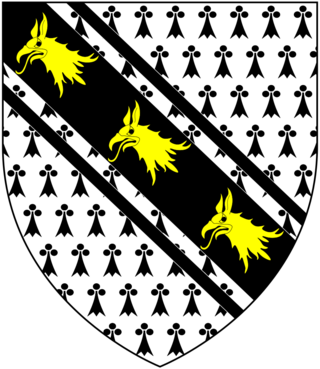Related Research Articles

Sir Walter Yonge, 2nd Baronet of Great House, Colyton, and of Mohuns Ottery, both in Devon, was a Member of Parliament for Honiton (1659), for Lyme Regis (1660) and for Dartmouth (1667–70).
Sir William Armine, 1st Baronet was an English politician who sat in the House of Commons at various times between 1621 and 1651. He supported the Parliamentary cause in the English Civil War.
Sir Thomas Bowyer, 1st Baronet was an English politician who sat in the House of Commons at various times between 1614 and 1642. He supported the Royalist cause in the English Civil War.

Menabilly is a historic estate on the south coast of Cornwall, England, situated within the parish of Tywardreath on the Gribben peninsula about 2 miles (3.2 km) west of Fowey.
John Wilde was an English lawyer and politician. As a serjeant-at-law he was referred to as Serjeant Wilde before he was appointed judge. He was a judge, chief baron of the exchequer, and member of the Council of State of the Commonwealth period.
Jonathan I Rashleigh, of Menabilly, near Fowey in Cornwall, was an English shipping-merchant, Member of Parliament for Fowey in 1614, 1621, 1625, April 1640 and November 1640, and 1661 and served as Sheriff of Cornwall in 1627. He supported the Royalist cause during the Civil War.

Sir Francis Wortley, 1st Baronet (1591–1652), poet and politician who sat in the House of Commons between 1624 and 1626. He supported the Royalist cause in the English Civil War.

Thomas Fanshawe, 1st Viscount Fanshawe KB was an English politician who sat in the House of Commons at various times between 1621 and 1661. He supported the Royalist cause in the English Civil War. Following the Restoration he was raised to the peerage.
Sir Thomas Hatton, 1st Baronet was an English politician who sat in the House of Commons of England variously between 1621 and 1640.
Sir John Cutts was an English politician who sat in the House of Commons variously between 1604 and 1640.
Sir Robert Pye (1585–1662) was an English courtier, administrator and politician who sat in the House of Commons between 1621 and 1629. He supported the Royalist cause in the English Civil War.

Sir William Fermor, 1st Baronet, was an officer in the Royalist army during the English Civil War. He stood for election as a Member of Parliament after the restoration of the monarchy in 1660, but died before a decision could be reached on whether he or another candidate had been elected.

Sir Christopher Hatton KB was an English politician who sat in the House of Commons between 1601 and 1614. He was also an active patron of the arts.
Sir Martin Lumley, 1st Baronet was an English politician who sat in the House of Commons from 1641 to 1648. He supported the Parliamentary cause in the English Civil War.
Robert Shute was an English judge and politician who sat in the House of Commons from 1571 to 1581.
Sir Drue Drury, 1st Baronet was an English landowner and politician who sat in the House of Commons between 1621 and 1624.
Sir Richard Spencer was an English nobleman, gentleman, knight, and politician who sat in the House of Commons from 1621 to 1629 and in 1661. He supported the Royalist cause in the English Civil War.
William Grey, 1st Baron Grey of Werke was an English politician who sat in the House of Commons from 1621 to 1622. He supported the Parliamentary cause in the English Civil War.

Sir William Whitmore was an English landowner and politician who sat in the House of Commons at various times between 1621 and 1626.
Sir Thomas Hatton, 2nd Baronet was an English politician who sat in the House of Commons from 1674 to 1679.
References
- ↑ The Orlebar Chronicles in Bedfordshire and Northamptonshire, 1553-1733, or the Children of the Manorhouse and their Posterity; by Frederica St. John Orlebar. Pub. Mitchell Hughes and Clarke, London, 1930. Back Matter, page 316 – Orlebar Pedigree: ... Jane, daughter of Robert Shute of Hockington, co. Cambridge (ancestor of Barrington Viscounts (Ireland, circa 1720); Baron of the Exchequer 1579).
- 1 2 3 4 'Oakington: Manors', A History of the County of Cambridge and the Isle of Ely: Volume 9: Chesterton, Northstowe, and Papworth Hundreds (1989), pp. 195-199. Date accessed: 14 March 2012
- ↑ Register of Admissions to Grays In 1521 - 1889
- ↑ Knights of England
- 1 2 The Gentleman's magazine, Volume 67, Part 2
- ↑ Charles Henry Parry, The Parliament and Councils of England, chronologically arranged
- ↑ Robert E. Ruigh The Parliament of 1624: politics and foreign policy
- ↑ 'House of Commons Journal Volume 6: 1 July 1651', Journal of the House of Commons: volume 6: 1648-1651 (1802), pp. 594-595. Date accessed: 14 March 2012